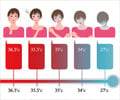A new study is looking into the possibility of treating comatose patients suffering from bacterial meningitis with hypothermia.

The randomized trial conducted in 49 intensive care units in France between February 2009 and November 2011 assessed 130 patients for eligibility and randomized 98 comatose adults with community acquired bacterial meningitis to the hypothermia group, where patients received a loading dose of 39°F cold saline and were cooled to 90°F to 93°F for 48 hours, or standard care.
The trial was stopped early because of concerns over excess mortality in the hypothermia group (25 of 49 patients [51 percent]) compared with the control group (15 of 49 patients [31 percent]). At 3 months, 86 percent in the hypothermia group compared with 74 percent in the control group had an unfavorable outcome (as gauged via the Glasgow Outcome Scale [a functional assessment inventory]).
"In conclusion, our trial does not support the use of hypothermia in adults with severe meningitis. Moderate hypothermia did not improve outcome in patients with severe bacterial meningitis and may even be harmful. Our results may have important implications for future trials on hypothermia in patients presenting with septic shock or stroke. Careful evaluation of safety issues in these future and ongoing trials are needed," the authors write.
Source-Eurekalert










